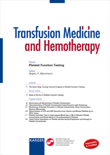
TRANSFUSION MEDICINE AND HEMOTHERAPY
Scope & Guideline
Leading the charge in hematology research and clinical practice.
Introduction
Aims and Scopes
- Transfusion Safety and Efficacy:
The journal emphasizes research on improving the safety of blood transfusions and the efficacy of blood components, including studies on pathogen reduction technologies and the impact of blood group compatibility. - Innovative Therapeutic Approaches:
It covers novel therapeutic methodologies such as CAR T-cell therapy, gene editing technologies, and advanced apheresis techniques, highlighting their applications in transfusion medicine. - Hematologic Disorders and Management:
The journal addresses various hematologic conditions such as hemophilia, thalassemia, and sickle cell disease, focusing on their diagnosis, treatment, and the implications of transfusion therapy. - Immunology and Alloimmunization:
Research on the immunological aspects of transfusion, including alloimmunization, blood group antigens, and the development of specific antibodies, is a core area of focus. - Clinical Practice and Blood Management:
The journal also discusses clinical practices surrounding blood donation, management, and utilization, as well as patient blood management strategies to optimize transfusion practices.
Trending and Emerging
- Cell and Gene Therapy Innovations:
There is a notable surge in research related to cell and gene therapies, particularly CAR T-cell therapy and CRISPR-based techniques, indicating a growing interest in utilizing these technologies for treating hematologic diseases. - Personalized Medicine in Transfusion Practices:
Emerging themes around personalized medicine, including tailored transfusion strategies based on genetic and immunological profiling, are gaining traction, reflecting a shift towards individualized patient care. - Pathogen Reduction and Blood Safety:
The focus on pathogen reduction technologies and their implications for blood safety is increasingly relevant, as concerns about transfusion-transmitted infections drive research in this area. - Artificial Intelligence and Big Data Applications:
The integration of artificial intelligence and machine learning in blood product management and quality control is on the rise, showcasing an innovative approach to enhancing transfusion practices. - Regulatory and Ethical Considerations in Transfusion Medicine:
There is a growing body of work addressing the regulatory and ethical challenges related to transfusion practices, particularly in the context of emerging therapies and technologies.
Declining or Waning
- Traditional Blood Component Therapies:
Research focusing solely on traditional blood component therapies without exploring newer technologies or methodologies is becoming less prominent, indicating a shift towards more innovative and targeted approaches. - General Blood Donation Practices:
Papers discussing general practices of blood donation without specific innovations or improvements have decreased, suggesting that the field is moving towards more specialized and advanced topics. - Historical Perspectives on Transfusion Medicine:
While historical analyses are valuable, there seems to be a waning interest in papers that do not connect past practices with current advancements or future directions in transfusion medicine.
Similar Journals
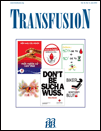
TRANSFUSION
Driving Progress in Clinical Transfusion PracticesTRANSFUSION is a prestigious peer-reviewed journal published by WILEY, dedicated to advancing the field of hematology and transfusion medicine. With an ISSN of 0041-1132 and an E-ISSN of 1537-2995, this journal serves as a vital resource for researchers and professionals alike, delivering high-quality studies and reviews that impact clinical practice and blood management strategies. The journal enjoys a strong reputation, evidenced by its impressive Q1 ranking in hematology and Q2 in both immunology and allergy as of 2023. Covering foundational aspects from 1958 to 2024, TRANSFUSION not only provides valuable insights but also fosters collaboration and innovation in understanding the complexities of blood donation, transfusion practices, and immunological responses. With its significant contributions to the scientific community, this journal is essential for those seeking to stay at the forefront of research and advancements in transfusion science.

Blood Research
Innovating Insights into Blood Disorders and TreatmentsBlood Research, published by SPRINGER, is a premier journal dedicated to the multifaceted realm of hematology, serving as a crucial platform for disseminating innovative research findings and advancements in the diagnosis and treatment of blood-related disorders. With an ISSN of 2287-979X and an E-ISSN of 2288-0011, this journal is recognized for its commitment to scholarly excellence and impact in the field, currently holding a reputable Q2 ranking in the Hematology category as per the 2023 metrics. The journal spans from 2013 to 2024, providing a broad archive of quality research that is vital for researchers, healthcare professionals, and students alike. Although it is not an Open Access journal, it offers insightful contributions that enhance the understanding of hematological science, fostering the exchange of knowledge crucial for advancing patient care and clinical practices globally. The journal’s performance is underscored by its Scopus ranking in the 46th percentile, reflecting its significant role in the ongoing discourse in hematology.
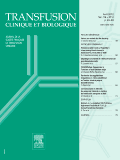
TRANSFUSION CLINIQUE ET BIOLOGIQUE
Fostering collaboration in the evolving landscape of transfusion medicine.TRANSFUSION CLINIQUE ET BIOLOGIQUE, an esteemed journal published by Elsevier France - Éditions Scientifiques Médicales Elsevier, has been a pivotal resource in the fields of transfusion medicine, biochemistry, and hematology since its inception in 1994. With a strong commitment to advancing scientific knowledge, this journal provides a platform for high-quality research and clinical studies aimed at improving patient care and outcomes in transfusion practices. Although categorized in Q3 and Q4 quartiles across multiple categories in Biochemistry and Medicine for 2023, the journal holds significant potential for growth and impact within the scientific community. While it currently does not offer open access options, its indexing in reputable databases ensures visibility and reach among professionals and researchers. As the field evolves, TRANSFUSION CLINIQUE ET BIOLOGIQUE aims to continue fostering innovation and collaboration, making it a valuable tool for anyone involved in medical, biochemical, and hematological research.
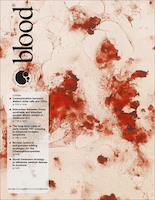
BLOOD
Advancing the Science of Hematology.BLOOD, published by the American Society of Hematology, is a premier peer-reviewed journal in the fields of Biochemistry, Cell Biology, Hematology, and Immunology. With an impressive impact factor and ranking in the top quartiles (Q1) across multiple disciplines, BLOOD is essential reading for researchers and professionals seeking to stay updated on the latest advancements in hematology and related fields. The journal has been a cornerstone of hematological research since its inception in 1946, providing a platform for rigorous scientific inquiry and discourse. Its commitment to publishing high-quality original research, comprehensive reviews, and insightful editorials makes it a vital resource for students, practitioners, and scientists alike. By offering exceptional access to influential publications, BLOOD continues to shape the future of hematology and enhance understanding of blood-related disorders, marking its vital role in advancing both basic and clinical research.

INTERNATIONAL JOURNAL OF HEMATOLOGY
Connecting Scholars in the Pursuit of Blood KnowledgeThe INTERNATIONAL JOURNAL OF HEMATOLOGY, published by SPRINGER JAPAN KK, serves as a critical platform for advancing research in the field of hematology. With a prestigious history spanning over three decades from 1991 to 2024, this journal is recognized for its impactful contributions, evidenced by its Q2 category ranking in Hematology for 2023, and its notable position at rank #71 out of 137 in the Scopus Medicine Hematology category. Researchers and professionals within the hematology community benefit from the journal's rigorous peer-reviewed articles that cover a wide range of topics, including clinical studies, basic research, and novel therapeutic strategies. Though currently non-open access, it provides essential insights and findings to an audience passionate about the latest advancements in blood disorders and treatments. Situated in Japan, the journal not only showcases high-quality research but also fosters a global exchange of knowledge in hematology, making it a significant resource for scholars, practitioners, and students alike.
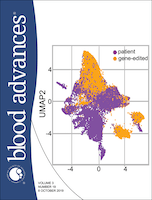
Blood Advances
Elevating Hematology Through Cutting-Edge ResearchBlood Advances is a premier, peer-reviewed journal published by Elsevier, dedicated to the field of hematology. With an impressive impact factor and classified within the Q1 category of hematology for 2023, it ranks as the 16th out of 137 journals in the Scopus Medicine Hematology category, placing it in the top 88th percentile globally. This influential journal, which has been disseminating invaluable research since its inception in 2017, focuses on advancing knowledge and innovation in blood science, including clinical and laboratory aspects of hematology. Although it offers limited open access features, its comprehensive scope encompasses various topics relevant to both researchers and practitioners. Located in the United States and managed from Amsterdam, Blood Advances provides a vital platform for the dissemination of groundbreaking research, making significant contributions to the understanding and treatment of blood disorders. Researchers, professionals, and students alike will find this journal an essential resource for keeping abreast of the latest developments and advancements in hematology.
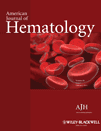
AMERICAN JOURNAL OF HEMATOLOGY
Championing Excellence in Hematology ResearchAmerican Journal of Hematology, published by Wiley, stands as a premier outlet for the dissemination of cutting-edge research in the field of hematology. With a commendable impact factor and ranked #9 out of 137 in the Scopus medicine category, this journal has established a robust presence since its inception in 1976. Operating in the Q1 quartile for hematology, it serves as a crucial resource for researchers, clinicians, and students dedicated to understanding blood disorders and advancing treatment methodologies. While the journal does not currently offer open access options, it remains highly regarded for its rigorous peer-review process and impactful contributions to the scientific community. With coverage extending into 2024, the American Journal of Hematology is committed to fostering innovation and collaboration within the hematological sciences.
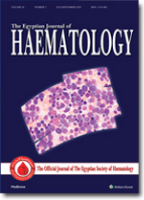
Egyptian Journal of Haematology
Unveiling Innovations in Hematologic ResearchThe Egyptian Journal of Haematology, published by WOLTERS KLUWER MEDKNOW PUBLICATIONS, stands as a pivotal resource in the field of hematology, particularly within the context of Egypt and the broader Middle Eastern region. This journal is dedicated to disseminating high-quality research that explores the latest advancements in blood disorders, hematologic malignancies, and transfusion medicine. With a focus on original research, case studies, and reviews, it aims to provide a comprehensive platform for hematologists, researchers, and healthcare professionals to enhance their understanding and management of hematological conditions. Although it is not an open-access journal, the rigorous peer-review process ensures that only the most impactful studies are published, contributing to the journal's reputation in the academic community. The Egyptian Journal of Haematology serves as an essential tool for advancing knowledge, improving clinical outcomes, and fostering collaboration among experts in the field.

Indian Journal of Hematology and Blood Transfusion
Elevating Knowledge: Your Source for Hematology ExcellenceIndian Journal of Hematology and Blood Transfusion, published by SPRINGER INDIA, serves as a leading platform for disseminating original research, reviews, and case studies in the field of hematology. With an ISSN of 0971-4502 and E-ISSN 0974-0449, this journal has been instrumental in advancing knowledge from 2000 to 2024, providing insights into critical issues surrounding blood disorders and transfusion practices. Currently ranked in the Q3 category for Hematology for 2023, it reflects a commitment to high-quality scientific content amidst a competitive landscape where it ranks 97/137 in Scopus for Medicine - Hematology, placing it in the 29th percentile of its peers. The journal primarily addresses a diverse readership, including researchers, healthcare professionals, and students, aiming to foster innovation and collaboration within the field. Although it operates under a subscription model, access options for individual articles and institutional subscriptions ensure that valuable research is disseminated widely to enhance medical practice and education in hematology.

GEMATOLOGIYA I TRANSFUZIOLOGIYA
Elevating Standards in Hematology ResearchGEMATOLOGIYA I TRANSFUZIOLOGIYA is an esteemed journal published by the MINISTERSTVO ZDRAVOOKHRANENIYA in the Russian Federation, focusing on the vital fields of hematology and transfusion medicine. With a rich history dating back to its inception in 1983, the journal plays a significant role in disseminating critical research and advancements in these areas, particularly relevant given the evolving landscape of medical science. As a recognized publication, it is indexed in Scopus and holds a Q4 category ranking in Hematology for 2023, reflecting its niche but important contributions to the field. Researchers, healthcare professionals, and students can look forward to a variety of peer-reviewed articles that not only address contemporary issues but also pave the way for innovative practices in hematology. Although it does not currently offer open access, the journal remains a valuable resource for those seeking to stay informed about the latest findings and developments.